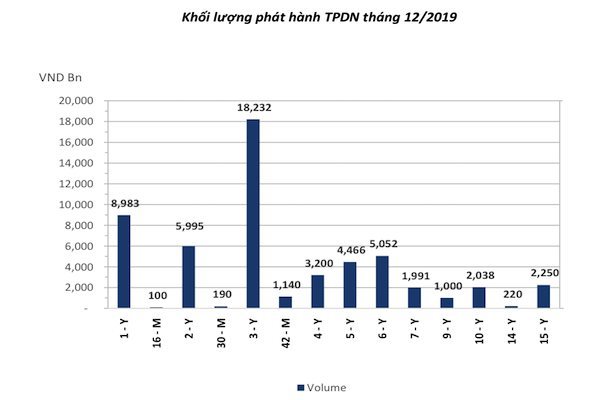The 2020 Vietnam Economy Report released in January by the Central Economic Committee once again pointed out the need for Vietnam to have independent credit rating institutions if it wants to develop the corporate bond market in a sustainable way and attract more investors.

The volume of corporate bonds issued in December 2019
In Vietnam, credit ratings are not a must for bond issuers. This explains why there is only one credit rating firm, Sai Gon Phat Thinh Credit Rating, which was established in 2017.
According to the former CEO of a foreign bank in Vietnam, Vietnamese enterprises have to use services by international credit rating firms such as Moody’s, Fitch and S&P when issuing international bonds, and have to pay high fees for the services.
| Vietnamese enterprises have to use services by international credit rating firms such as Moody’s, Fitch and S&P when issuing international bonds, and have to pay high fees for the services. |
Therefore, only large enterprises which issue bonds in large scale use the services of the firms.
In such conditions, establishing Vietnamese credit rating firms is a solution. However, a question has been raised about the quality of services from Vietnamese firms.
The former CEO believes that Vietnam should learn from other countries which set up credit rating firms under joint ventures, foreign firms teaming up with domestic units to set up joint ventures. In the joint ventures, foreign firms are in charge of service technique, while domestic partners have licenses and networks.
“I think Vietnam should also go that way. When Vietnamese firms have enough experience, they will operate as independent service providers,” he said, affirming that the cooperation with foreign partners will help increase customers’ confidence and prestige.
At present, credit rating is not mandatory for bond issuers. Therefore, enterprises only have to expose information when issuing corporate bonds on their websites and on stock exchanges’ websites on corporate bonds. The information is not clear enough for investors to assess risks before making investments.
The Prime Minister has approved a plan to develop credit rating services by 2020 with the vision until 2030. Vietnam plans to grant licenses to five credit rating firms at maximum by 2030 and stipulate that bond issuers all have to have credit rated.
The Central Economic Committee estimates that the volume of corporate bonds issued successfully in 2019 was VND270 trillion, an increase of 9.9 percent over 2018.
The corporate bond market in 2019 had the value equal to 11 percent of GDP, higher than the 8.6 percent of 2018 and higher than the targeted 7 percent of GDP set by the government in the 2017-2020 corporate bond development plan.
Linh Ha

Ministry eyes tightening corporate bond issuance amid market’s overheating
The Ministry of Finance will tighten regulations over corporate bond issuance because of an overheating market to protect investors and prevent risks...

Banks rush to issue bonds ahead of capital requirement deadline
Rising medium- and long-term capital demands to meet stricter regulations on credit safety limits and capital adequacy early next year were putting pressure on commercial banks to issue bonds in the final months of the year, experts said.
 The lack of independent credit rating firms is hindering the development of the corporate bond market.
The lack of independent credit rating firms is hindering the development of the corporate bond market.